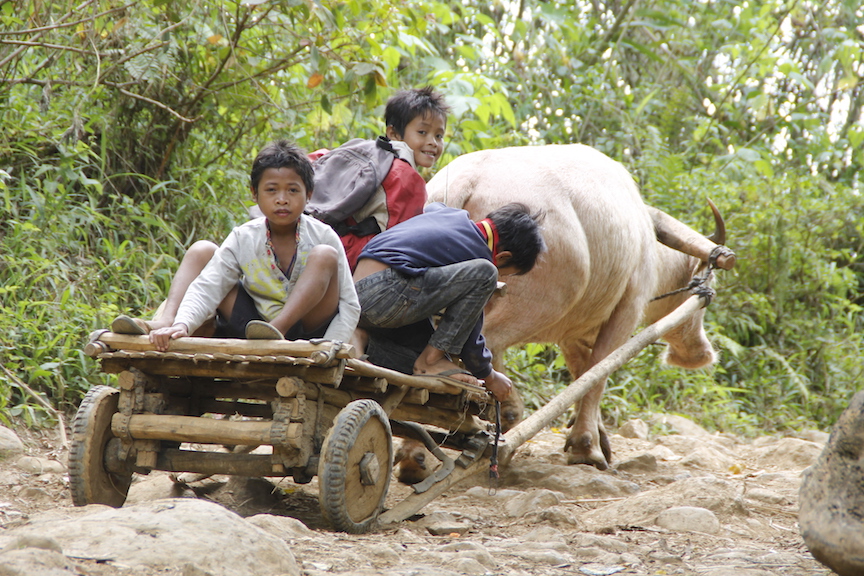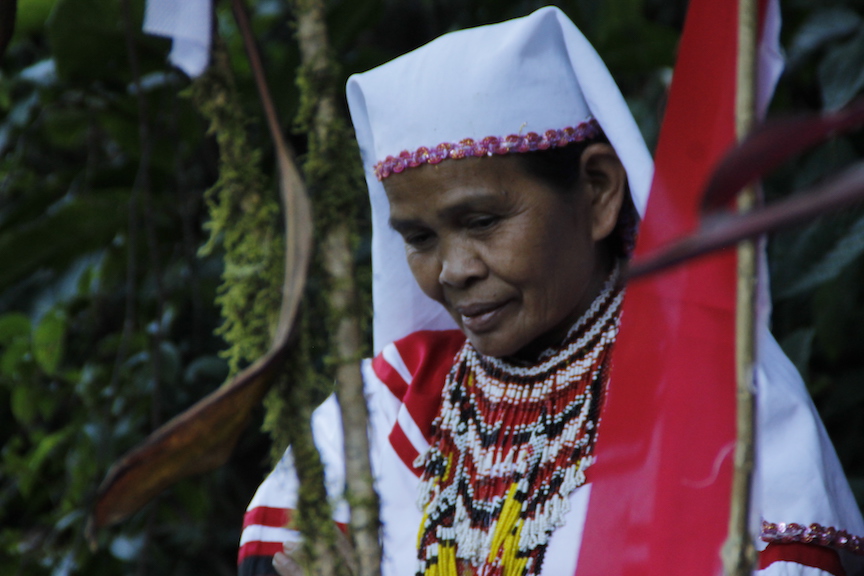 Talaandig children in Songco, Lantapan, Bukidnon. MindaNews file photo by H. MARCOS C. MORDENO
Talaandig children in Songco, Lantapan, Bukidnon. MindaNews file photo by H. MARCOS C. MORDENO
MALAYBALAY CITY (MindaNews / 12 January) – Indigenous peoples must understand and assert their right to self-determination, tribal leaders in Bukidnon told the Bukidnon 2018: Public Outlook Series initiative.
Datu Amay Iwag E. Linsahay, a Talaandig chieftain in Manolo Fortich town, defined the right to self-determination as freedom from conquest and submission to beliefs, knowledge, power and ideologies imposed by outsiders.
But he noted that IPs lack due to attempts by various groups and individuals to divide them through programs, projects and other means.
He said the government and other sectors should respect such right, as it is “something that can be used against hunger, poverty, abuses and conflicts inside ancestral domain territories.”
He conceded that the manipulation by those in power and the shortcomings of the IPs themselves are both to blame for their current situation. “But the greater weight is from those in power. Remember, the IPs are the victims here.”
He said one serious step to address the issue is relationship building through dialogues between select “culturally aware” IP leaders citing the Bukidnon IP Advisory Council and different stakeholders.
He said the group should sit down with policymakers and various government agencies because in many instances they only send representatives who cannot decide. He proposed dialogues too with the business sector on the free and prior informed consent (FPIC) issue and with the IP mandatory representatives in all government levels.
Datu Rodelio “Waway” Saway of the Talaandig tribe in Songco, Lantapan town said the IPs must be freed from hunger and violence. A musician, artist and community organizer, Saway called for an end to poverty in resource-rich Bukidnon.
The Talaandig along with the other tribes in Bukidnon have initiated the 1 million lutia (taro) movement, where people plant the crop as a concrete step in fighting poverty by making their lands productive.
In October last year, Waway’s elder brother Datu Migketay Victorino Saway led launching rites of the project where they eyed to set up a cooperative that will facilitate production and processing of their products.
The elder Saway said via SMS that they are looking forward that hunger and poverty in the province will be addressed this year.
Los Baños, Laguna-based Telesforo Sungkit, a Higaonon novelist from Malitbog town said IP leaders should strive more in fighting for the welfare and interest of their constituents. “They should refrain from being used as pawns of the political and economic interests of the local ruling elite in the province.”
He called on government, including the Bukidnon provincial government to “truly honor the ancestral domains of the indigenous peoples”.
On the peace front, he challenged both the military and the rebels. “I wish the killings of IP leaders will stop. I wish the AFP and the NPA will be responsible enough by avoiding the targeting of civilians in their armed encounters.”
Consultation
Datu Sangkuan Jemuel Perino, tribal chieftain of the Bukidnon Umayamnon Tribe Kapoonan To Mga Datu in Cabanglasan town, said the government should pursue peace process with the rebels.
He cited that peace and security is among the top three issues tackled in the Indigenous Peoples Mindanao Conference Committee of holders of Certificate of Ancestral Domain Titles (CADT) in Mindanao. The other two issues are violations of the FPIC and livelihood opportunities.
 Bae Inatlawan Adelina Tarino of the Bukidnon-Daraghuyan tribe performs a ritual in the forest of Mt. Kitanglad in Bukidnon. MindaNews file photo by H. MARCOS C. MORDENO
Bae Inatlawan Adelina Tarino of the Bukidnon-Daraghuyan tribe performs a ritual in the forest of Mt. Kitanglad in Bukidnon. MindaNews file photo by H. MARCOS C. MORDENO
Perino, a core group member of the committee. appealed for both parties to keep the ancestral domains as zones of peace and for the monitoring of the compliance with the Comprehensive Agreement on Human Rights and International Humanitarian Law.
“We’re not involved in the conflict. I hope we would not get hit” he said, adding some IP leaders were allowed to sit in the stalled peace talks between the government and the National Democratic Front.
But Perino lamented the Office of the Presidential Adviser on the Peace Process’s relocation of rebel returnees in their ancestral domains. He said the decision did not undergo the FPIC process, although meetings have been set to address the issue.
Loreta Sol L. Dinlayan, in-charge of the Bukidnon Studies Center which houses the Ethno-Cultural Museum of Bukidnon State University, said she opposed the idea of making ancestral domains the battleground of conflicting groups.
“This is injustice. One basic human right is the right to live in a peaceful community. IP communities deserve this right,” she said.
She added the IPs especially in the interior of Bukidnon should not be exploited by any ideological group.
“Let us proceed with peace process, go on with dialogue because the situation of those caught in crossfire is difficult,” she added.
Malaybalay Bishop Jose A. Cabantan said he hopes that there will no longer be encampments at the Capitol grounds by IP groups wanting to avoid armed hostilities in their areas.
“Whatever is the root cause of this may be addressed while respecting their own culture and their own way of resolving conflicts and in responding to a situation in their community,” said the bishop, who from 2011 to 2015 was the vice chair of the CBCP Episcopal Commission on the Indigenous Peoples.
Development plans
Richard Macas, the IP mandatory representative to the Bukidnon provincial board said they are looking forward to “more empowered and economically improved” IPs in 2018 citing the provincial government’s multi-million livelihood project and continued support for the titling of ancestral domains.
He said his office will spearhead with the NCIP the integration of IP plans in the local development plans.
He added that their Ancestral Domain Sustainable Development and Protection Plan (ADSDPP) must be integrated with the local government development plan to facilitate funding. The ADSDPP is one of the requirements in applying for CADT.
But he said they are yet to assess if this has been followed in the 464 barangays in 20 towns and two cities. He said the cooperation of all IP mandatory representatives is needed to facilitate the work.
Carl Binayao, former community affairs officer of the National Commission on Indigenous Peoples-Bukidnon said there were ADSDPPs from CADT holders that have been adopted by the local legislative councils in the province.
There were a total of 200 CADT applications, Perino said. Fifty-seven of these applications have been included as “priority” for assistance under the P10-million fund from the provincial government for the titling process.
Dinlayan said there should also be monitoring if the ADSDPPs of CADT holders have been implemented. But she recognized that it is the lookout of both government and the IP communities themselves.
Bae Alma Binayao, of the Manobo-Talaandig in Maramag, Bukidnon said the CADT should be awarded to the IPs in the province this year.
Binayao, IP mandatory representative to the Sangguniang Bayan of Maramag, said her wish is for the recognition of their rights based on the Indigenous Peoples Rights Act, native title and the right to self-determination.
“I hope the IPs can experience real change and that they can take back their ancestral lands, which for a long time have been used by outsiders,” she added in the vernacular.
She said the IPs can start uplifting their situation once their lands are given back to them in a manner that will be fair to the IPs and non-IPs.
Binayao’s tribe has claimed a portion of land inside Central Mindanao University in Musuan, Maramag as their ancestral domain, a move opposed by the state-run school. Then president Gloria Macapagal-Arroyo issued an order awarding the contested area to the claimants. But CMU questioned Arroyo’s order before the Supreme Court which is yet to issue a verdict.
Gov. Jose Ma. R. Zubiri Jr. has issued a statement that he will propose an amicable settlement.
Binayao’s group admitted there were indeed talks indeed but CMU officials have been mum so far.
Opportunities
Lawyer Burt Estrada of the Bukidnon Tagolwanen said IP communities should be given much needed opportunities to develop their ancestral domains. “By empowering the Lumad to engage in inclusive business will improve their economic conditions while at the same time protect our environment.”
He said the IPs might actually be able to provide “sustainable solutions” to the problems created by modernity.
He said it would be good if people will learn and live the principles enshrined in the Bonkatol ha bulawan daw nang ka tasa ha lana or the basis of their values system.
He cited the principles as mutual recognition and respect (kilalaha), mutual sharing of information (sayuda), cooperation (buliga), mutual protection and preservation of life (uyaga) and mutual obligation to help the needy (pagbatunbatuna).
Emma Molina, of civil society group Barog Bukidnon said priority must be given to efforts to uplift the lives of the IPs without compromising their culture and traditions.”
She said there is a need to provide necessary sources of livelihood and to provide education to deserving Bukidnon IPs.
Datu Makapukaw Adolino Saway, chieftain of the Talaandig tribe and head of the Mt. Kitanglad Council of Elders, said the IPs should receive allocations from the national and local governments.
Ma. Rosario Saldua, of the Malaybalay City Planning and Development Office said basic services should reach marginalized groups like the IPs.
Bae Inatlawan Adelina Docenos Tarino, tribal chieftain of the Bukidnon Daraghuyan in Dalwangan, Malaybalay City said they are awaiting help for their IP housing project.
Way to go
Ma. Easterluna Canoy, executive director of the Kitanglad Integrated NGOs said there is a need to foster genuine leadership that is anchored on cultural integrity.
But she challenged tribal leaders to take active moves to reconcile ethnic differences and bridge opportunities with government and private sectors to improve the quality of their lives.
She added that the IP communities can also create new ways to educate the outside world to recognize its responsibility in safeguarding the environment.
Dinlayan said that with the P664-billion budget for education in 2018, the government should provide more assistance to elementary and high schools in areas where the majority are IP residents.
She noted that with free education in the tertiary level, IP students still need to organize themselves to put up a support system to cover for other expenses in going to schools outside their communities.
“It is still crucial that the IP youth can access information and be guided how to avail of free tuition as many of them are not aware,” she said.
Dinlayan added that IP leaders may also occupy more positions in the socio-political and economic arena. “This can be done if all IP leaders and IP professionals will organize and bring out a strong representation for the IPs.” (Walter I. Balane/MindaNews Contributor)
[BUKIDNON 2018: PUBLIC OUTLOOK SERIES is a community journalism project that seeks to provide space for the public to speak up on the future of the province in 2018. The editorial team sent text messages and sought interviews with random sources from different sectors in the province from December 25 to 28, 2017. The responses were consolidated and categorized thematically and then used as bases for stories in these pieces. React to waltzib@gmail.com.]
